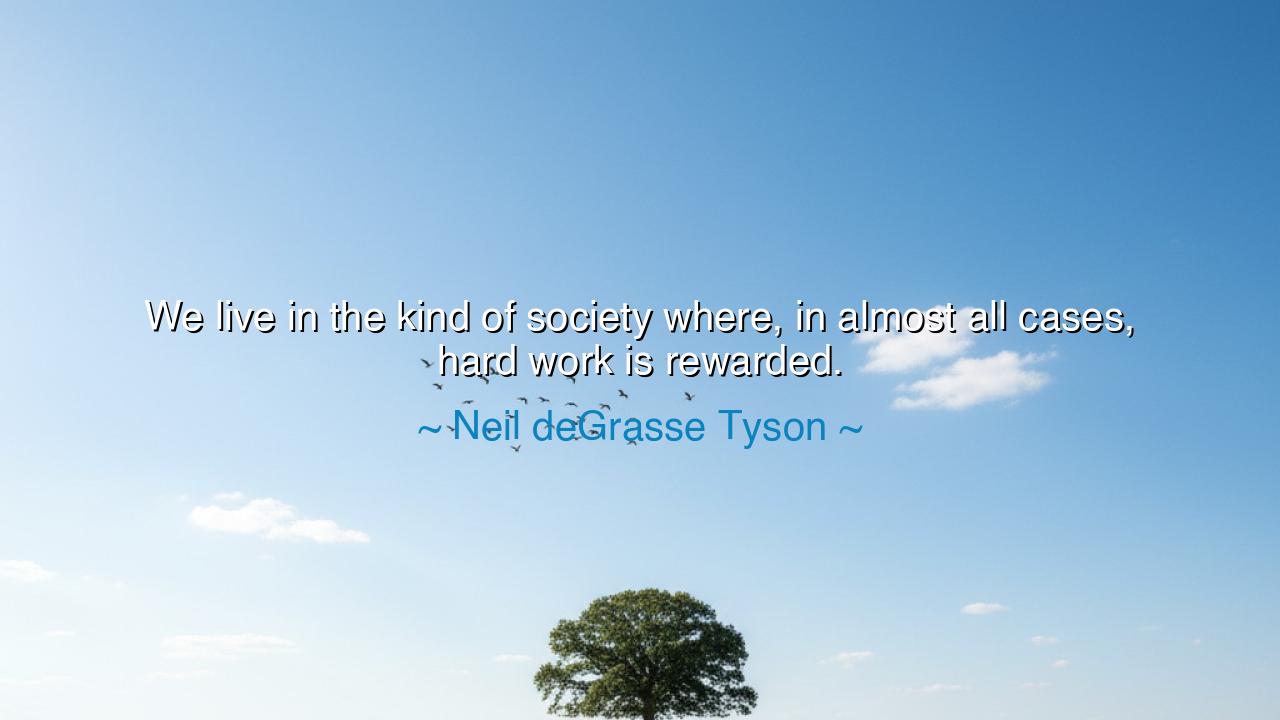
We live in the kind of society where, in almost all cases, hard






Hear the words of Neil deGrasse Tyson, spoken with the voice of one who gazes into the heavens yet keeps his feet upon the earth: “We live in the kind of society where, in almost all cases, hard work is rewarded.” This is not mere optimism, but a profound recognition of the covenant between effort and opportunity. Tyson speaks to the principle that though fortune and privilege may sometimes distort the path, in the vast majority of cases it is hard work that shapes destiny, not idleness nor mere chance. His words remind us that society, though imperfect, still bows to the eternal law: the sweat of the brow yields fruit, and diligence carves the way to greatness.
The origin of this thought lies in Tyson’s own journey, born to modest beginnings in the Bronx, where curiosity about the stars propelled him toward the heights of astrophysics. He did not inherit privilege, nor was the road free of obstacles. Yet through relentless study, unwavering effort, and the refusal to surrender to discouragement, he rose to become one of the most recognized voices of science in the modern world. His life itself embodies the truth of his statement: society rewards effort, and even when recognition is delayed, perseverance lights the path.
The ancients too bore witness to this truth. Consider the story of Odysseus, who, after the fall of Troy, wandered for ten years across seas fraught with monsters, temptations, and despair. It was not cunning alone that brought him home to Ithaca, but persistence, the refusal to abandon the journey. His reward was not immediate, but in the end, through toil and endurance, he reclaimed his throne and his family. Just so, Tyson proclaims: in the long arc of effort, the world bends toward reward for the diligent.
History offers another tale in the life of Thomas Edison, who is said to have failed a thousand times before perfecting the incandescent bulb. To the world, he appeared defeated; yet to him, each failure was another step toward victory. His hard work, compounded over years, brought light to nations and reshaped the rhythms of human existence. Here again, the truth of Tyson’s words is clear: reward may not come swiftly, but it comes to those who endure in labor.
The meaning of the quote is thus both encouragement and reminder. Encouragement, because it tells us that our effort is not in vain—that even if the world resists, persistence overcomes. Reminder, because it insists that society, though flawed, still bends toward justice in rewarding effort. Not all paths are equal, and not all rewards are immediate, but history proves again and again that those who work with passion and resilience achieve what others dismiss as impossible.
What lesson, then, shall we take for ourselves? That in the face of hardship, we must not surrender. That when obstacles rise, they are not signs of futility but the testing grounds of perseverance. And that we must honor effort not only in ourselves but in others—rewarding it with recognition, fairness, and opportunity. For if hard work is the foundation of progress, then to ignore it is to weaken the pillars of society itself.
Therefore, children of the future, engrave this upon your hearts: hard work is the fire that tempers the soul, and society rewards those who refuse to let that fire die. Do not fear the long road, nor despise small beginnings. Work with honesty, with persistence, with vision, and in time your labor will bear fruit. For the world has always bowed, and will continue to bow, to the greatness of those who give themselves fully to their work—and through them, society itself is uplifted.






AAdministratorAdministrator
Welcome, honored guests. Please leave a comment, we will respond soon